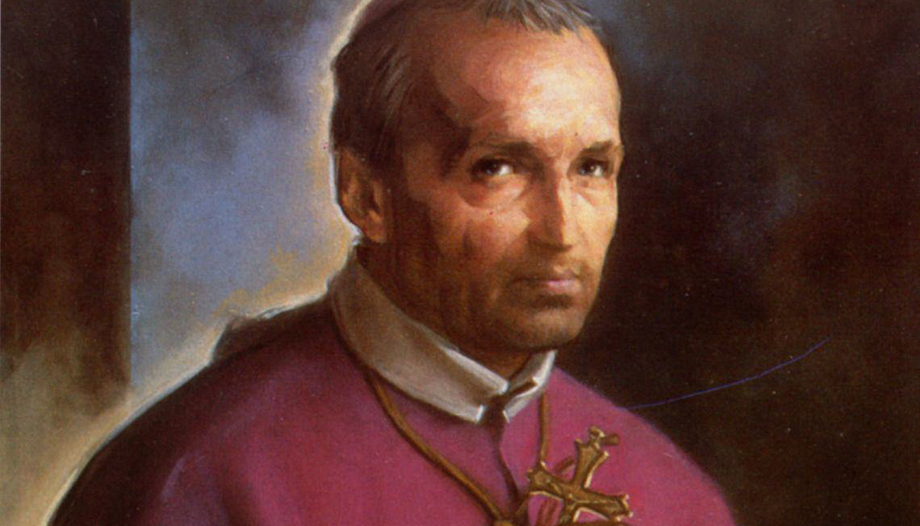St. Alphonsus was born in Marianella, near Naples, on September 27, 1696. His father, Giuseppe de' Liguori, of noble family, was Admiral of the fleet of the Kingdom of Naples. His mother, Anna Cavalieri, a very pious woman, took special interest in Alfonso's religious formation. He also received an excellent humanistic education in his family, including literature, philosophy, music and painting. He was very fond of the latter two arts, which he practiced with great mastery.
He studied law at the University of Naples and obtained a Ph. in utroque iuris in 1713, when he was only 16 years old.
For ten years he practiced law in the courts of Naples. In 1723 he left law to enter the Seminary. He was ordained a priest on December 26, 1726.
Moved by the desire to bring the Word of Christ to the abandoned people in the countryside, on November 2, 1732, he left Naples to live among the peasants in Scala. There he founded the Congregation of the Most Holy Redeemer, which obtained pontifical approval in 1749.
In 1762 he was elected bishop of Sant'Agata dei Goti (Benevento), where he remained until 1775, when he resigned for health reasons. During that period he remained the Rector Major of the Redemptorists.
He died in Pagani, near Naples, on August 1, 1787, at the age of 90. He was beatified in 1816 and canonized in 1839. He was also proclaimed Doctor of the Church in 1871, as well as Patron of confessors and moral theologians in 1950.
His writings
The literary production of St. Alphonsus is vast, and he is one of the most published authors in history, having had more than 20,000 editions in more than 70 languages. We list here, in chronological order, only his works that deal with the spiritual life of the Christian:
1. Visits to the Blessed Sacrament (1754). It contains in 31 considerations for each day of the month, devout and affectionate thoughts that can be used in the Visits to the Blessed Sacrament.
2. The Glories of Mary (1750). The first part contains an explanation of the Salve, while the second part explains Mary's faith, virtues and sorrows.
3. The great means of prayer (1759). It explains how prayer is a necessary means to obtain all the graces of God that we need. In this work is found the famous lapidary phrase, collected in the Catechism of the Catholic ChurchNo. 2744: "Whoever prays is certainly saved, whoever does not pray is certainly condemned".
4. Practice of love for Jesus Christ (1768). It is an explanation of St. Paul's hymn to charity in 1 Corinthians 13.
5. Meditations on the Passion (1773). They are the fruit of St. Alphonsus' personal meditation on the Passion of the Lord, which was the favorite theme of his meditations.
His teachings
His spiritual doctrine is so rich and abundant, that here I can only give a few brushstrokes.
St. Alphonsus' piety is eminently Christocentric. He teaches that worship of the Incarnate Word must be the center of all Christian life. He sees Jesus above all as the Savior of humanity, which is embodied in his favorite motto, which he assigned as a program to his religious Congregation: Copiosa apud eum redemptio ("His Redemption is abundant").
The Doctor of the Church considers the love of Jesus Christ especially in three events: the Incarnation, the Passion and the Eucharist. He manifested his devotion to the Child Jesus through songs and poems. He composed the carol Tu scendi dalle stelle ("You come down from the stars"), which has become the Italian Christmas carol par excellence.
He urged daily meditation on the Mystery of the Passion of the Lordas he himself did. The aspect that he mainly emphasizes in this meditation is the theme of love, which he sees as the ultimate reason that moved Jesus to suffer and die. From the meditation on the Passion, a response of love to the love of Jesus Christ arises in the Christian's soul: "A soul that believes and thinks of the Passion of the Lord cannot possibly offend him and not love him, and indeed cannot possibly go mad with love, seeing a God almost maddened by love for us. There is no means that can inflame us more in the love of God than the consideration of the Passion of Jesus Christ".
With regard to the EucharistIn this regard, St. Alphonsus is considered the defender of frequent communion, combating the reminiscences of Jansenism, for which he teaches that Communion must be received with a suitable disposition and not with a dignified one, as the Jansenists affirmed: "I have said with a suitable disposition and not with a dignified one, as the Jansenists affirmed: "I have said with a suitable disposition and not with a dignified one". appropriate arrangementnot only with the worthybecause if it were necessary to worthy who could receive communion? Only another God would be worthy to receive God. I understand by convenient that which befits a miserable creature. It is enough that the person receives communion in the grace of God and with the lively desire to grow in the love of Jesus Christ".
St. Alphonsus is considered the defender of frequent communion, combating the reminiscences of Jansenism.
Manuel Belda
The entire spiritual doctrine of St. Alphonsus is permeated with a Marian spirit. He placed at the basis of his Mariology two inspiring principles, the divine maternity of Mary and her participation in the work of Redemption. These two prerogatives are not parallel, but closely related to each other, since the first is ordered to the second and the second finds its ontological foundation in the first.







